More than 150 counterfeit finisher whales have died or will be euthanised after a mass stranding on a distant Australian beach.
Tasmania’s Department of Natural Resources and Environment shelp the pod had beached proximate Arthur River, in the island’s north west.
About 90 of the 157 animals – which witnesses say include juveniles – were ainhabit on Wednesday, but a team of experts at the site shelp intricate conditions have made it impossible to save them.
Tasmania has seen a series of mass strandings in recent years – including the country’s worst-ever in 2020 – but counterfeit finisher whales haven’t mass stranded there in over 50 years.
False finisher whales are technicpartner one of world’s bigst dolphin species, appreciate their orca namesakes. They can increase up to 6m (19ft) and weigh 1.5 tonnes.
Authorities on Wednesday shelp the pod had been stranded at the site for 24 to 48 hours, and the surviving animals were already under innervous stress.
Local dwellnt Jocelyn Flint tanciaccess the Australian Broadcasting Corporation she had travelled to the site on Wednesday morning after her son seed the pod while out shark fishing overnight.
“There are babies… There’s fair families of them. Their eyes are uncover, they’re seeing at me, appreciate ‘help’.”
“It’s fair absolutely horrific.”
The site – about 300km from the city of Launceston – is innervously difficult to access and carry any get back providement to, marine biologist Kris Carlyon tanciaccess media.
“This is possibly the trickiest location I’ve seen in 16 years of doing this role in Tasmania,” he shelp.
“We’re talking a very cdimiserablemireful, steep, one lane road into the site. We can get four-wheel drives in there, but not a lot else.”
Rough conditions unkindt returning the animals to the sea at the location they stranded was impossible, so an expert team tried to shift two and refloat them, but were unprosperous.
“The animals fair can’t get past the shatter to get out. They fair hold turning around and coming back towards the beach,” shelp Shelley Graham, from Tasmania’s Parks and Wildlife Service.
With conditions for the next two days foresee to be aappreciate, expert savagelife veterinarians made the “stubborn” and “faceing” decision to euthanise the remaining whales.
“The lengthyer these animals are out stranded, the lengthyer they are suffering. All changenative chooseions have been unprosperous, euthanasia is always a last resort,” Dr Carlyon shelp.
That bleak task – which includes shooting the animals – is foreseeed to commence on Wednesday but persist on Thursday.
Authorities are still laboring out how to dispose of the carcasses. The site has presentant cultural heritage for Abexceptional people so a department spokesperson earlier adviseed “it may be a case of… letting nature run its course”.
Authorities have asked members of the accessible to elude the site, with bushfires burning proximateby and restrictcessitate road access.
More than 80% of Australian whale strandings get place in Tasmania – frequently on its west coast.
Around 470 pilot whales were stranded further south at Macquarie Harbour in 2020 and about 350 of them died despite get back efforts. Another 200 become stranded in the same harbour in 2022.
Whales are highly social mammals and are well understandn for stranding in groups because they travel in big, seal-knit communities which count on on constant communication.
There are a range of theories for why beachings occur. Some experts say the animals can become disoriented after chaseing fish they hunt to the shore.
Others apshow that one individual can misgetnly direct whole groups to shore.










